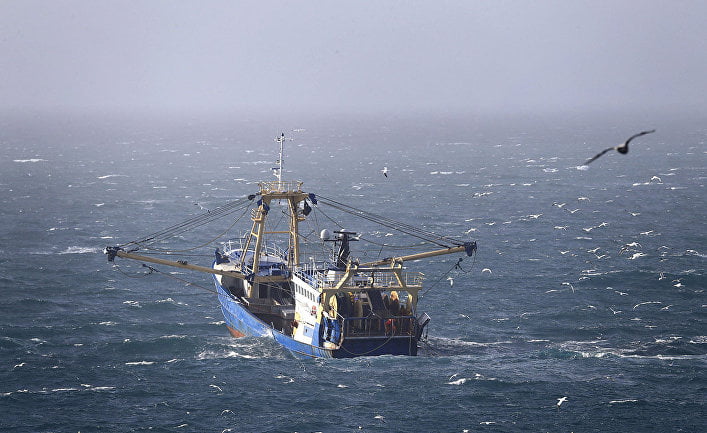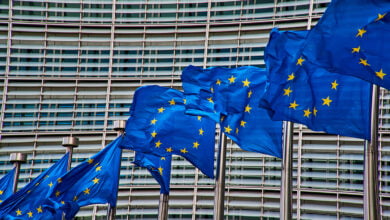
Four Navy ships to guard UK fishing grounds in case of Brexit no deal
US, WASHINGTON (ORDO NEWS) — Fisheries remain one of the key obstacles in the harrowing trade negotiations between the EU and the UK on Brexit. Meanwhile, London has already prepared to protect its fishing grounds from “uninvited guests” from the EU with the help of warships since January. How it can end - read the article from the Guardian.
Two ships of the British Navy will be at sea, and two more will be put on alert in case fishing vessels of the EU countries enter the British exclusive economic zone.
Beginning January 1, four Royal Navy patrol ships will assist the UK authorities in securing fishing grounds if the country leaves the EU without a deal. This situation brings back memories of the “crash wars” of the 1970s.
Armed ships with a length of 80 meters will have the right to stop, inspect and detain those vessels of the EU countries that will fish within the British exclusive economic zone 320 kilometers wide from the coast.
The deployment was long-planned, according to UK Navy sources, but the final decision came after Conservative ministers quietly doubled the total fleet of patrol ships from four to eight - in part with a view to the crisis that could begin in the event of Brexit. without agreement. “We have done a great job to prepare for any contingencies,” said one insider.
Although the British patrol ships are equipped with machine guns, experts say they are unlikely to use weapons against EU fishing vessels. Instead, they will walk alongside a vessel that appears to be in violation of the rules, and the British military can climb aboard it for inspection if required.
In extreme cases, a boat from an EU member state may be detained and taken to the nearest UK port. “Nobody is going to fire warning shots at French fishermen; firearms, in principle, are used only when there is a danger to life, ”said a source in the Navy.
During the “cod wars” between British and Icelandic trawlers in the early 1970s, sailors regularly cut fishing nets, and enemy boats regularly rammed each other. In the course of several clashes, shots even sounded.
Fishing remains one of the key obstacles in the harrowing trade negotiations between the EU and the UK. Sharp economic disputes over quotas, timing and duration of the transition period for this industry have pitted Paris with London.
In the absence of a deal, EU boats will be banned from fishing in the British Exclusive Economic Zone. However, this would also mean that British fishing vessels will be barred from entering the waters of neighboring EU member states.
This week, the EU proposed extending the fisheries transition period by one year so that a deal can be negotiated, which underscores the importance of the crisis.
Speaking after the meeting of EU leaders on Friday 11 December, European Commission President Ursula von der Leyen said: “We understand that the United Kingdom is seeking to control its waters. On the other hand, the UK must understand the legitimate expectations of the EU fishing fleets based on decades and sometimes centuries of free access.”
European and British boats have long fished in each other’s waters. Today, EU trawlers receive about 60% of their catch in British waters. Much of this is mackerel and herring, which are not very popular in the UK and are therefore exported, while fish popular in the UK, such as cod, are usually imported.
It is unclear how effectively the British Navy will be able to patrol the exclusive economic zone in practice - perhaps they will use satellite surveillance to determine the location of EU fishing vessels. It is also unclear how aggressively the UK government will want to act against the courts of France and other members of the European Union, given how complicated relations with this bloc are now.
Fish protection patrol vessels have long operated in UK waters, but the Brexit without a deal will bring major changes to the tasks their crews will have to perform. Two of the patrol ships will go to sea later this year, while the other two will remain fully operational in port - initially in British waters, but can be deployed anywhere in the United Kingdom. In theory, it will be possible to use other warships, if Boris Johnson makes such a decision.
Chris Parry, a former rear admiral and former chairman of the Organization of Maritime Governance, said ministers should act decisively. “I would try to set an example and take one or two EU fishing vessels to Harwich or Hastings. If one or two ships are detained, the rest will no longer want to violate the borders. ”
But Defense Committee Chairman Tobias Ellwood has admitted that he is worried that the British Navy will squander its resources at a time when Russian submarines are increasingly appearing in waters around the United Kingdom. “Our adversaries will laugh as Europe’s largest armies fight each other for fish.”
A spokesman for the UK Department of Defense said: “The Department of Defense has undertaken extensive planning and preparation to ensure that it is prepared for a range of different scenarios at the end of the transition.”
—
Online:
Contact us: [email protected]
Our Standards, Terms of Use: Standard Terms And Conditions.









